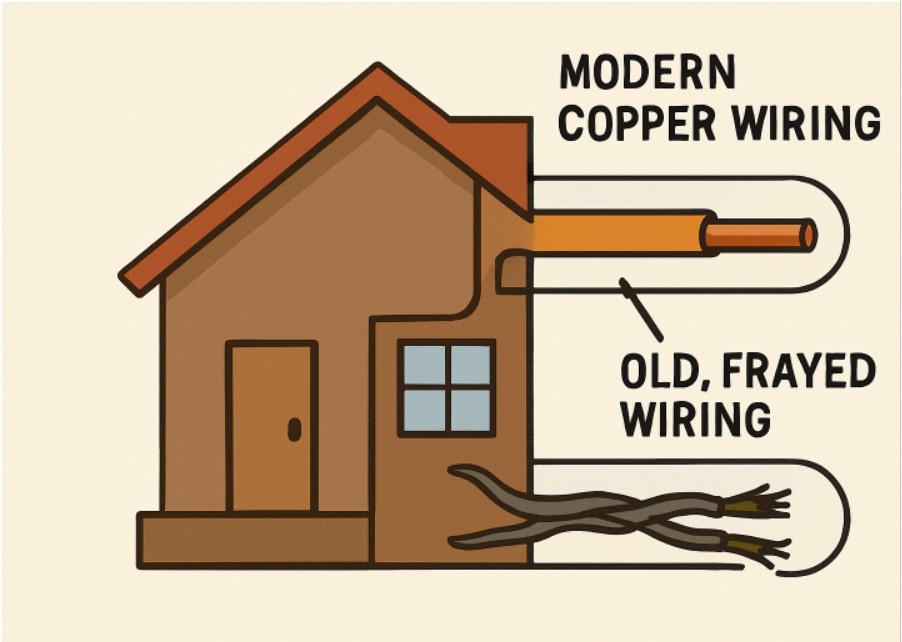Essential Considerations for Homeowners Before Rewiring a House

Recognizing the Need for Rewiring
Identifying when your home may require a full or partial rewire is critical to maintaining a safe and functional living space. Telltale signs include circuit breakers that trip often, persistent flickering lights, and wall outlets that feel warm or give off a burning smell. Aging homes—especially those 25 years or older—may have wiring that poses safety hazards or can’t keep up with modern appliances. That’s why local homeowners must schedule inspections and consider Hendersonville, NC house rewiring services by licensed electricians when these red flags appear.
Rewiring can resolve these hazards, boost your home’s energy efficiency, and support today’s higher electric demands from devices, HVAC systems, and kitchen appliances. According to the National Fire Protection Association, outdated or deteriorating wiring is a leading cause of residential electrical fires, underscoring the need for proactive attention.
Assessing the Scope of the Project
Home rewiring isn’t simply about replacing wires behind your walls; it’s a comprehensive process that could involve upgrading the main panel, replacing old outlets and switches, and ensuring your setup complies with current building codes. The complexity of this work depends largely on the home’s size and age—older houses often require more extensive updates to remove obsolete knob-and-tube or aluminum wiring systems. The timeline for a total rewire can range from one to two weeks.
Budgeting is also closely linked to project size. While smaller homes or partial rewiring jobs could be more cost-effective, full-house rewires generally cost between $4,000 and $6,000 on average. However, variations exist in labor rates, material choice, and location.
Obtaining Necessary Permits
Homeowners must adhere to local regulations before breaking ground on any electrical project. Permits ensure project compliance with safety standards, helping to prevent fines or forced do-overs by local authorities. Most municipalities will require a permit for any major electrical upgrade or replacement, including full or partial rewiring. Your electrician can often handle the permitting process as part of their services, safeguarding your safety and property investment.
Choosing the Right Materials
The choice of wiring materials plays a significant role in your electrical system’s safety and longevity. Most modern homes use copper wiring, prized for its excellent conductivity and resistance to corrosion. Conversely, homes from previous decades may contain aluminum wire, which is now considered a higher fire risk due to a tendency for overheating and connection failure. Other outdated systems, such as knob-and-tube wiring, are almost always recommended for full replacement. Ensure any new installations—wires, circuit breakers, and outlets—are UL-listed and comply with the latest electrical codes to future-proof your investment.
Hiring a Qualified Electrician
Electrical work comes with significant risks—mistakes can result in fires, serious injury, or costly property damage. Working with a licensed and insured electrician is essential for ensuring your rewiring meets code and is performed to the highest standard. Certified professionals can diagnose hidden dangers (such as overloaded circuits or improper grounding), guide your materials selection, and expedite the permit process. While DIY electrical work is possible in isolated situations, a whole-house rewire is best left to experienced professionals for safety and peace of mind.
Planning for Future Electrical Needs
When planning a rewire, it’s wise to anticipate your future needs—not just today’s. The growing market for electric vehicles, smart appliances, and home automation systems means that additional outlets, stronger circuits, and flexible control options will become more important. Consider integrating USB outlets, dedicated lines for HVAC or high-draw appliances, and pre-wiring for security cameras or smart thermostats. Strategic upgrades can enhance home value, comfort, and resale appeal while helping future-proof your living space.
Budgeting and Cost Considerations
Rewiring represents a sizeable investment. Beyond the materials and electrician fees (most of the cost), you may also need to replace portions of drywall or repaint affected sections. Installing a new circuit breaker panel alone costs between $250 and $400, not including the cost for rewiring the associated rooms or circuits. To manage expenses, compare quotes from several licensed electricians, and consider coordinating rewiring with other home renovations to minimize overall disruption and labor costs.
Ensuring Safety During the Process
Rewiring is not only about modernizing your home, but also about safeguarding it. Faulty wiring is a substantial contributor to residential fires. Ensure all work is thoroughly inspected before the power is restored, and ask your electrician about post-installation testing protocols. Don’t overlook temporary safety measures to reduce accident risks during the project, especially if you and your family remain home while work is underway.
Final Thoughts
Committing to a house rewire is a substantial but necessary investment, particularly in older homes where safety and modern convenience are at stake. By identifying problem signs early, choosing quality materials and professional help, and preparing for future needs, homeowners can feel confident that their electrical system is built to last. Taking a systematic, safety-conscious approach ensures your family, property, and investment are well protected for years.



